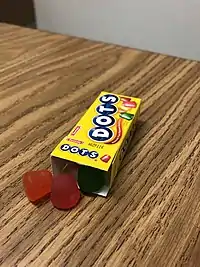Dots (candy)
Dots, or Mason Dots (trademarked DOTS), is a brand of gum drops marketed by Tootsie Roll Industries, which claims that "since its 1945 launch," the candy has become "America's...#1 selling gumdrop brand."[1] According to advertisements, more than four billion dots are produced from the Tootsie Roll Industries Chicago plant each year.[2]

According to PETA, Dots are vegan,[3] and according to the Tootsie Roll Industries website, they are gluten-free, nut-free, peanut-free, and kosher[4] (officially certified kosher by the Orthodox Union as of December 1, 2009).[5][6]
History
Dots were introduced in 1945 by Mason and trademarked that year. In 1972, Tootsie Roll Industries acquired the Dots brand by purchasing the Mason Division of Candy Corporation of America. Prior to that acquisition they were manufactured by Mason, AU and Magenheimer Confectionery Manufacturing Company of Brooklyn and later Mineola, New York.[1][7]
Crows are the oldest candy in the Dots family, first created in the late 19th century.[1] Original dots date back to 1945, Tropical Dots to 2003, and Yogurt Dots to 2007.[1] Sour Dots were introduced in 2009–2010.
Flavors and varieties

Flavors
Current flavors for "Original Dots" include cherry (red), lemon (yellow), lime (green), orange (orange), and strawberry (pink).[1]Sour Dots have five flavors, but are created with citric acid: cherry, lemon, orange, grape, and green apple. Flavors for Tropical Dots include Island Nectar, Wild Mango, Grapefruit Cooler, Carambola Melon, and Paradise Punch; and for Yogurt Dots, Banana, Orange, Blackberry, and Lemon-Lime.[1]
Crows, black licorice flavored gum drops, are also considered to be part of the Dots family, created in the 1890s by confectioners Ernest Von Au and Joseph Maison. There is an urban legend that Crows were supposed to be called "Black Rose", but the printer misheard the name as "Black Crows" and printed wrappers with the wrong name on them.[8] However, research—including the fact that the name was copyrighted before the candies ever came with wrappers—reveals that this story is not true.[8]
Varieties
In addition to current varieties of Original Dots (also known as Mason Dots), Tropical Dots, Yogurt Dots, Sour Dots, and Crows, past varieties (including special short-term promotional offerings) have included:
Halloween specialties
Three special Halloween varieties of Dots have been marketed:[9]
- Ghost Dots are translucent light green, with the same flavors of Original Dots, but without the different colors to indicate which flavor any particular gum drop might have.
- Bat Dots are black-colored Dots that are blood orange flavored.
- Candy Corn Dots are candy corn flavored and resemble candy corn.
Other holiday specialties
Other holiday specialties have included:
- Christmas Dots, which have a Vanilla (white) top with either a Cherry (red) or Lime (green) base
- Valentine Dots, which have a Vanilla (white) base with either a Cherry (red) or Passion Fruit (pink) top
- Easter Dots in Blueberry (blue), Lemon (yellow), Lime (green), Cherry (red), and Orange (orange) (introduced in 2010)
Other varieties and flavors
Other varieties and flavors have included:
- Wild Berry Dots were introduced in 2000. Wild Berry Dots are sweet, chewy gumdrops coated with a tart, crunchy coating. Wild Berry Dots were discontinued in 2007.
- Dots Elements in pomegranate (earth, purple), cinnamon (fire, red), green tea (water, green), and wintergreen (air, teal) (introduced in 2008; no longer being produced)
- Hot Dots (a.k.a. Cinnamon Dots) were released in 2004, but were discontinued in 2006.
- Patriotic Dots, which have a vanilla (white) top with either a strawberry (red) or blueberry (blue) base
- During the 1980s, there was a variety of Dots called Spice Dots.
- Special individual flavor packages such as Pink Grapefruit, Peach, and Watermelon. Marketed as "sour slices", they maintain the gumdrop shape of all other Dots.[2][10][11][12]
Ingredients
Dots contain: Corn syrup, sugar, food starch-modified, malic acid, natural and artificial flavors, sodium citrate, and artificial colors.[13]
See also
References
- "Tootsie Roll Inc".
- www.candywarehouse.com, advertisement for DOTS, retrieved November 1, 2011.
- PETA website retrieved October 31, 2011.
- Tootsie roll website, health and nutrition section, retrieved October 31, 2011.
- News and press release section of tootsie.com, retrieved October 31, 2011.
- Orthodox Union press release, December 2, 2009, retrieved November 1, 2011.
- information on Mason, AU, and Magenheimer Confectionery Manufacturing Company, retrieved November 1, 2011.
- candyprofessor.com page describing Black Crows candy, retrieved October 31, 2011.
- candyblog.net page on Halloween dots, retrieved November 1, 2011.
- watermelon dots description, candywarehouse.com, retrieved November 1, 2011.
- peach dots description, candywarehouse.com, retrieved November 1, 2011.
- pink grapefruit dots description, candywarehouse.com, retrieved November 1, 2011.
- "Tootsie Roll Inc".